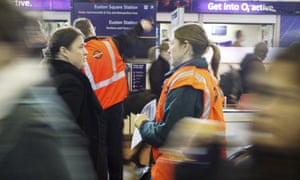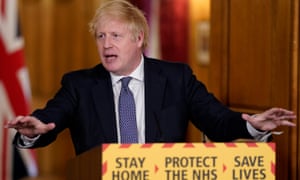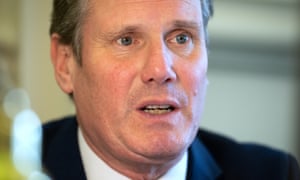Unions criticise guidance and say staff may refuse to turn up unless safety is guaranteedRowena Mason and Heather Stewart Tue 5 May 2020 THE GUARDIAN

Manuel Cortes, general secretary of the TSSA, warned that the government’s demands for hugely increasing public transport from next week were unrealistic. Photograph: Newscast/REX/Shutterstock
Workers may refuse to turn up or stage walk-outs unless the government helps guarantee their safety, trade unions have warned amid anger over guidance designed to ease the lockdown.
As ministers prepare to urge the country back to return to work, Labour joined a string of trade unions in criticising draft guidelines for being vague, inadequate and putting staff at risk because employers can choose how closely to follow them.
They warned that vulnerable people such as pregnant women, those with underlying conditions such as cancer, asthma and diabetes, and over-70s could be forced to work without enough protections.
Keir Starmer, the Labour leader, backed workers’ concerns on Monday night, saying: “People rightly need confidence that it’s safe before they go back out to work, travel or use public services.” He called for a “national safety standard” for businesses, schools and public services, with clear guidelines on social distancing.
Boris Johnson is intending to set out on Sunday how restrictions can be eased, amid concerns about the economic cost of the lockdown – and pressure from restive Conservative MPs.
A string of Tories raised concerns about the continuing restrictions in the Commons on Monday, with Sir Graham Brady, chair of the 1922 committee, calling for the removal of “arbitrary rules and limitations on freedom as quickly as possible” and suggesting the public had been “a little too willing to stay at home”.
Business groups and trade unions were given 12 hours to respond to draft guidelines over the weekend for how to protect people at work if the two-metre rule cannot be followed, with suggestions including physical shields, time limits on face-to-face meetings and staggered shift times.
According to sources, other workplace measures include reduced hot-desking and avoiding the sharing of equipment including pens. A section marked PPE contains only a promise of more detail. One section says employers could consider limiting how many people are in a vehicle, without saying how many the government considers would be safe.
Unions, led by the Trades Union Congress (TUC), criticised the non-binding guidelines for letting employers decide what is safe when it comes to distance between workers, cleaning practices and the use of personal protective equipment (PPE).
The TUC, which represents 5.5m workers through its member unions, warned that under the current guidance “bad bosses will be able to expose workers to infection without fear of consequences”.
The section referring to workers with underlying health conditions says they should be “asked to take extra care in observing social distancing” and “helped to work from home where possible” – or alternatively “offered the safest possible roles”, the Guardian understands.
Workers may refuse to turn up or stage walk-outs unless the government helps guarantee their safety, trade unions have warned amid anger over guidance designed to ease the lockdown.
As ministers prepare to urge the country back to return to work, Labour joined a string of trade unions in criticising draft guidelines for being vague, inadequate and putting staff at risk because employers can choose how closely to follow them.
They warned that vulnerable people such as pregnant women, those with underlying conditions such as cancer, asthma and diabetes, and over-70s could be forced to work without enough protections.
Keir Starmer, the Labour leader, backed workers’ concerns on Monday night, saying: “People rightly need confidence that it’s safe before they go back out to work, travel or use public services.” He called for a “national safety standard” for businesses, schools and public services, with clear guidelines on social distancing.
Boris Johnson is intending to set out on Sunday how restrictions can be eased, amid concerns about the economic cost of the lockdown – and pressure from restive Conservative MPs.
A string of Tories raised concerns about the continuing restrictions in the Commons on Monday, with Sir Graham Brady, chair of the 1922 committee, calling for the removal of “arbitrary rules and limitations on freedom as quickly as possible” and suggesting the public had been “a little too willing to stay at home”.
Business groups and trade unions were given 12 hours to respond to draft guidelines over the weekend for how to protect people at work if the two-metre rule cannot be followed, with suggestions including physical shields, time limits on face-to-face meetings and staggered shift times.
According to sources, other workplace measures include reduced hot-desking and avoiding the sharing of equipment including pens. A section marked PPE contains only a promise of more detail. One section says employers could consider limiting how many people are in a vehicle, without saying how many the government considers would be safe.
Unions, led by the Trades Union Congress (TUC), criticised the non-binding guidelines for letting employers decide what is safe when it comes to distance between workers, cleaning practices and the use of personal protective equipment (PPE).
The TUC, which represents 5.5m workers through its member unions, warned that under the current guidance “bad bosses will be able to expose workers to infection without fear of consequences”.
The section referring to workers with underlying health conditions says they should be “asked to take extra care in observing social distancing” and “helped to work from home where possible” – or alternatively “offered the safest possible roles”, the Guardian understands.

Boris Johnson is due to detail how restrictions will be eased on Sunday. Photograph: Andrew Parsons/10 Downing Street/Crown Copyright/PA
But unions fear that creates a loophole that could allow exploitative bosses to pressure vulnerable staff to return to the workplace.
The TUC is also calling for employers to be obliged to publish the risk assessments they will have to carry out before staff can return, to allow workers to scrutinise them.
The GMB, which has more than 600,000 members, said the guidance “does not adequately protect workers from Covid-19 exposure and as a result many may refuse to work to avoid putting themselves and their families at risk”.
It highlighted section 44 of the Employment Rights Act 1996, which gives workers the “right to cease work in circumstances of serious and imminent danger to themselves or others” and said it was “clear that failure to adequately control or mitigate Covid exposure risk would be considered serious and imminent danger by the worker”.
John Phillips, the GMB’s acting general secretary, said: “For weeks the government has warned people this virus is dangerous and they must maintain social distancing and abide by the lockdown. They cannot just flick a switch, say it’s safe to work within two metres of other people without PPE and expect them to head merrily off to work.”
Manuel Cortes, general secretary of the Transport Salaried Staffs’ Association (TSSA), warned that the government’s demands for hugely increasing public transport from next week were unrealistic.
“It’s not just for the staff but passengers – how safe will people feel on overflowing train or tube carriages at the moment?” he said. “Health and safety laws allow people to walk off jobs if they are at risk. That is the law of our country. And clearly our members are knowledgeable about the law.
“But I hope we will not reach that stage because I do believe employers actually do care about the health and safety of members and the travelling public.”
With the government keen to open schools from next month, teaching unions say they are awaiting detailed discussions about how that could take place safely.Q&A
What are the UK government's 'five tests' for ending lockdown restrictions?Show
Kevin Courtney, the joint general secretary of the National Education Union, said “there needs to be an in-depth conversation about how we can keep education staff safe and, we think, parents and carers of children, safe in this context”.
Senior union sources said they believed the government would have to improve its workplace guidance in negotiations, especially to protect the vulnerable, but if not, then many trade unions would have to advise their members not to go into work if they feel at risk.
Our priority is protecting the public. We supported the lockdown and support restrictions staying in place at this time
Keir Starmer
However, they also stressed that the government appeared to want to avoid industrial tensions at a time of national crisis. Ministers are also concerned about ensuring workers feel safe enough to venture out of lockdown.
In a hint that the government might be willing to make concessions to assuage public fears, Amanda Solloway, the business minister, told MPs on Monday that her department was negotiating with employers and unions to “come to a shared view” about workplace safety.
She was speaking after Frances O’Grady, the TUC general secretary, wrote to the business secretary, Alok Sharma, saying unions would have “no hesitation” in telling members that the guidelines cannot protect workers unless they were significantly strengthened.
The letter, seen by the Guardian, says: “Working people need to see that the government is genuinely committed to protecting their health and safety. At present, this guidance fails to provide clear direction to those employers who want to act responsibly and is an open goal to the worst of employers who want to return to business at usual – which will put their workforce at risk.
“We want to be able to recommend the government’s approach to safe working to our members and the wider workforce. As it stands, we cannot.”
Labour threw its weight behind the TUC’s concerns. Starmer said the government must address trade union concerns about coronavirus safety at work, as he unveiled a seven-point plan for a “national consensus” on tackling the virus.
Speaking ahead of talks with the prime minister later this week, he said: “Our priority is protecting the public’s health and saving lives. That is why we supported the lockdown and again support the restrictions staying in place at this time.”
Starmer also said the government should beef up the health and safety executive, which will have the job of enforcing new safety rules, but has been hit by deep budget cuts in recent years.
A business department spokesperson said: “We have been working with businesses, union leaders and the science and medical community on developing sensible guidance for businesses that will give UK workers the utmost confidence they can return to work safely.
“As part of this process we have worked closely with the TUC and look forward to continuing that close engagement, and will of course consider any recommendations they make carefully.”
What are the UK government's 'five tests' for ending lockdown restrictions?
Hancock would not give any assurances that older people would be treated in the same way as younger people when the lockdown is eased, although he said that had been the approach so far.
“The [over-70s] are not part of the shielded group, which is about individual conditions. But unfortunately it is a scientific fact that older people are more susceptible to having very serious consequences of this disease and a much higher proportion of people sadly who’ve died are in the older groups,” he said.
However, they also stressed that the government appeared to want to avoid industrial tensions at a time of national crisis. Ministers are also concerned about ensuring workers feel safe enough to venture out of lockdown.
In a hint that the government might be willing to make concessions to assuage public fears, Amanda Solloway, the business minister, told MPs on Monday that her department was negotiating with employers and unions to “come to a shared view” about workplace safety.
She was speaking after Frances O’Grady, the TUC general secretary, wrote to the business secretary, Alok Sharma, saying unions would have “no hesitation” in telling members that the guidelines cannot protect workers unless they were significantly strengthened.
The letter, seen by the Guardian, says: “Working people need to see that the government is genuinely committed to protecting their health and safety. At present, this guidance fails to provide clear direction to those employers who want to act responsibly and is an open goal to the worst of employers who want to return to business at usual – which will put their workforce at risk.
“We want to be able to recommend the government’s approach to safe working to our members and the wider workforce. As it stands, we cannot.”
Labour threw its weight behind the TUC’s concerns. Starmer said the government must address trade union concerns about coronavirus safety at work, as he unveiled a seven-point plan for a “national consensus” on tackling the virus.
Speaking ahead of talks with the prime minister later this week, he said: “Our priority is protecting the public’s health and saving lives. That is why we supported the lockdown and again support the restrictions staying in place at this time.”
Starmer also said the government should beef up the health and safety executive, which will have the job of enforcing new safety rules, but has been hit by deep budget cuts in recent years.
A business department spokesperson said: “We have been working with businesses, union leaders and the science and medical community on developing sensible guidance for businesses that will give UK workers the utmost confidence they can return to work safely.
“As part of this process we have worked closely with the TUC and look forward to continuing that close engagement, and will of course consider any recommendations they make carefully.”
Workplace coronavirus safety rules must be binding, says Labour
Keir Starmer criticises government’s draft guidance as ‘pretty vague’ and calls for enforcement of common set of standards
Rowena Mason Deputy political editor Tue 5 May 2020 THE GUARDIAN

Keir Starmer criticises government’s draft guidance as ‘pretty vague’ and calls for enforcement of common set of standards
Rowena Mason Deputy political editor Tue 5 May 2020 THE GUARDIAN

Keir Starmer said people were ‘really worried about going to work’.
Photograph: Leon Neal/Getty Images
The Labour leader, Keir Starmer, has called for sanctions on employers who flout rules on keeping workers safe from coronavirus, as Matt Hancock, the health secretary, refused to confirm how new guidance on social distancing at work would be enforced.
Starmer said people were “really worried about going to work” and called for a consensus between the government, opposition parties, employers and trade unions on how to make workplaces safe with national standards on social distancing and handwashing.
In a round of broadcast interviews, he branded the government’s draft guidance on social distancing at work “pretty vague” and called for real enforcement of a common set of standards to help reassure people that lifting the lockdown would be safe.
Unions are deeply concerned about the guidance, warning that it could let rogue employers get away with endangering their staff if the government advice is voluntary and not enforceable.
Pressed on the issue, Hancock avoided saying whether there would be binding standards for employers on keeping workers safe. He told Sky News that such issues were “under discussion” between trade unions and the business department but stopped short of setting out how those employers who disobey the rules would be punished.
The government has been worried that people may be too concerned about coronavirus to want to leave the lockdown, while trade unions warned on Monday that many could refuse to go back to work or stage walk-outs if they felt unsafe.
Starmer argued that national standards would give “a degree of confidence”, telling ITV’s GMB: “The point that trade unions have raised is safety at work and there was a consultation document the government put out last weekend which was pretty vague, and it needs strengthening.
The Labour leader, Keir Starmer, has called for sanctions on employers who flout rules on keeping workers safe from coronavirus, as Matt Hancock, the health secretary, refused to confirm how new guidance on social distancing at work would be enforced.
Starmer said people were “really worried about going to work” and called for a consensus between the government, opposition parties, employers and trade unions on how to make workplaces safe with national standards on social distancing and handwashing.
In a round of broadcast interviews, he branded the government’s draft guidance on social distancing at work “pretty vague” and called for real enforcement of a common set of standards to help reassure people that lifting the lockdown would be safe.
Unions are deeply concerned about the guidance, warning that it could let rogue employers get away with endangering their staff if the government advice is voluntary and not enforceable.
Pressed on the issue, Hancock avoided saying whether there would be binding standards for employers on keeping workers safe. He told Sky News that such issues were “under discussion” between trade unions and the business department but stopped short of setting out how those employers who disobey the rules would be punished.
The government has been worried that people may be too concerned about coronavirus to want to leave the lockdown, while trade unions warned on Monday that many could refuse to go back to work or stage walk-outs if they felt unsafe.
Starmer argued that national standards would give “a degree of confidence”, telling ITV’s GMB: “The point that trade unions have raised is safety at work and there was a consultation document the government put out last weekend which was pretty vague, and it needs strengthening.
Q&A
What are the UK government's 'five tests' for ending lockdown restrictions?
“That’s why one of the principles I’ve set out today is a national safety standard. I think people will want to know: if I’m going back to work, is it a safe environment, what’s being done about social distancing, what are the hand-washing facilities, if I need protective equipment am I going to get it? It’s that degree of reassurance.”
Starmer also raised concerns about the emphasis that Hancock is placing on getting people to download an app to help trace the contacts of those confirmed as infected with coronavirus. The mission to test, track and trace those with coronavirus is part of the plan for new outbreaks of coronavirus to be suppressed, as the UK exits the lockdown.
“I am a bit concerned that a similar app in Singapore only had a 20% take up rate,” Starmer told BBC Radio 4’s Today programme. “You’re going to have to have more manual tracing as well.”
The government launched a pilot scheme on Monday to trial the app in the Isle of Wight, where people are being urged to download it.Q&A
What is contact tracing?Show
Hancock said the app was “a very, very positive step in terms of us all being able to get some of our liberty back”.
He added: “By having the test, track and test in place we can release more of the social distancing measures and, as I said, the more people who download it ... the more effective it will be and the more we can control the spread of the virus, and that’s why it’s so important to do this.”
The app has been criticised by some campaigners for jeopardising people’s privacy. Amnesty International has raised concerns that “the government may be planning to route private data through a central database, opening the door to pervasive state surveillance and privacy infringement, with potentially discriminatory effects”.
However, Hancock dismissed that charge as “completely wrong.” Asked why, he said: “Firstly because the data is stored on your phone until you need to get in contact with the NHS in order to get a test and secondly because the purposes of this are purely and simply to control the spread of the virus, which is really important.
“Thirdly because we’ve all had to give up significant infringements on our liberty, for instance with the social distancing measures and the lockdown, and we want to release those, and this approach will help us to release them ... I can reassure you that it’s completely untrue.”
The health secretary was also questioned about whether new rules for social distancing and staying at home would be different for the over-70s and people with underlying health conditions.
Many Tory MPs are urging the government not to treat people differently based on age, with Sir Graham Brady, leader of the backbench 1922 Committee, urging government to let older people take their own decisions about the risks
Starmer also raised concerns about the emphasis that Hancock is placing on getting people to download an app to help trace the contacts of those confirmed as infected with coronavirus. The mission to test, track and trace those with coronavirus is part of the plan for new outbreaks of coronavirus to be suppressed, as the UK exits the lockdown.
“I am a bit concerned that a similar app in Singapore only had a 20% take up rate,” Starmer told BBC Radio 4’s Today programme. “You’re going to have to have more manual tracing as well.”
The government launched a pilot scheme on Monday to trial the app in the Isle of Wight, where people are being urged to download it.Q&A
What is contact tracing?Show
Hancock said the app was “a very, very positive step in terms of us all being able to get some of our liberty back”.
He added: “By having the test, track and test in place we can release more of the social distancing measures and, as I said, the more people who download it ... the more effective it will be and the more we can control the spread of the virus, and that’s why it’s so important to do this.”
The app has been criticised by some campaigners for jeopardising people’s privacy. Amnesty International has raised concerns that “the government may be planning to route private data through a central database, opening the door to pervasive state surveillance and privacy infringement, with potentially discriminatory effects”.
However, Hancock dismissed that charge as “completely wrong.” Asked why, he said: “Firstly because the data is stored on your phone until you need to get in contact with the NHS in order to get a test and secondly because the purposes of this are purely and simply to control the spread of the virus, which is really important.
“Thirdly because we’ve all had to give up significant infringements on our liberty, for instance with the social distancing measures and the lockdown, and we want to release those, and this approach will help us to release them ... I can reassure you that it’s completely untrue.”
The health secretary was also questioned about whether new rules for social distancing and staying at home would be different for the over-70s and people with underlying health conditions.
Many Tory MPs are urging the government not to treat people differently based on age, with Sir Graham Brady, leader of the backbench 1922 Committee, urging government to let older people take their own decisions about the risks
Hancock would not give any assurances that older people would be treated in the same way as younger people when the lockdown is eased, although he said that had been the approach so far.
“The [over-70s] are not part of the shielded group, which is about individual conditions. But unfortunately it is a scientific fact that older people are more susceptible to having very serious consequences of this disease and a much higher proportion of people sadly who’ve died are in the older groups,” he said.













